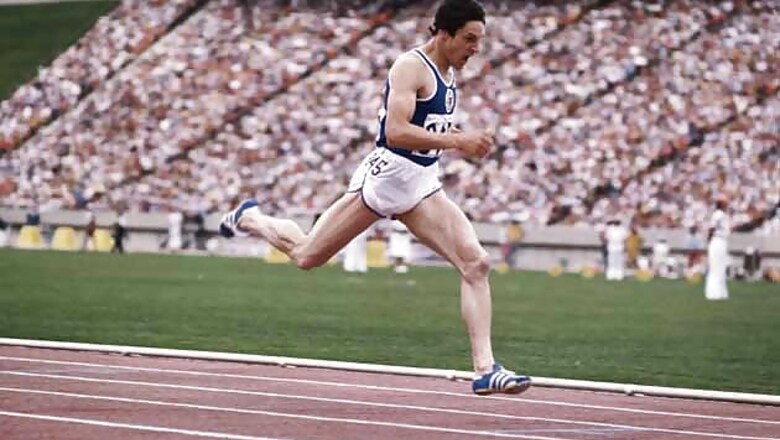
views
In the countdown to the 2012 London Olympics, we retrace some memorable achievements in the history of the Games. Today, a look at Allan Wells' gold in 1980, Sebastian Coe and Steve Ovett's historic rivalry, Carl Lewis' awesome but arrogant 1984 Olympics and Zola Budd's controversial race in part five of our Olympic moments recall.
1980: Allan Wells wins 100m gold in Moscow
At 28, Allan Wells was considered old for a sprinter. Good thing for Scotland that the sprinter wasn't listening to the critics.
The 1980 Olympics had been marred by sporting boycotts by 50 countries, led by the USA, West Germany, Canada, China and Japan. The British Government too backed the boycott, but the British Olympic Association did not. Ultimately, a British contingent missing the hockey team and those athletes who opted out for personal reasons was sent to Russia.
Choosing to participate in the chance of a lifetime, Wells primed himself to become the first British sprinter since Peter Radford won bronze in Rome 1960 to win an Olympic medal. Having spent days and days on end rigorously training in an unheated garage with the aim of winning medals in Moscow on his mind, Wells – who was already the British record holder at both 100 and 200 metres – was at peak fitness when he landed in Moscow in 1980. It was this attitude that turned him into a champion.
In the second round of the 100-metre race, Wells set a new British record of 10.11 seconds. A winning performance in the semi-finals followed. The 100-metre final was a thrilling race, in which Wells and Cuba's Silvio Leonard appeared to have crossed the finish line together. Upon close examination, though, Wells was declared the winner and thus became the oldest ever Olympic 100-metre champion.
Wells coasted into the final, clocking the fastest time en route (20.59 in the second round) but ultimately came second to world record-holder Pietro Mennea. He did manage to set a British record of 20.21 seconds and became a Scottish sporting legend.
1980: Clash of the titans
Before the 1980 Moscow Olympics, Sebastian Coe and Steve Ovett, Britain's great middle-distance rivals, had raced only once on the track. The pair dominated middle distance running in the late 1970s and first half of the 1980s, but nothing matched their rivalry in Moscow.
During a ten-day period, the two sprinters traded the world record for the mile between them three times. At one point Coe held the 800 metre, 1500 metre and mile world records at the same time, while Ovett subsequently became both the 1500 metre and mile world record holder. In the 800 metre, Coe's favoured race, Ovett beat his rival. Then Coe turned the tables in Ovett's preferred 1500 metre.
It was sport at its engaging best. Never has there been such a sprinting rivalry between two men.
1984: Carl Lewis wins four gold medals in LA
Carl Lewis entered the 1984 Los Angeles Games as one of the most decorated track and field athletes in the world, and pulled out all stops in finishing with four gold medals. Lewis, an African-American, was determined to match his hero Jesse Owens and succeeded in doing so – easily winning the 100 metre (in 9.9 seconds), 200 metre (a US sweep), 4x100 metre relay (setting anew world record) and long jump (he only took two jumps out of his allotted six) to earn a place in history alongside his lifelong idol.
Lewis' actions copped him criticism, however. He was dubbed brash after his manager admitted that he wanted to earn as much money as Michael Jackson. During the Games, Lewis opted to live with a friend instead of at the Olympic village. After he won the 100 metre, he did a victory lap with a US flag handed to Lewis by a fan. When he decided to take just two jumps out of six in the long jump, spectators booed him.
It was the beginning of a long reign by King Carl.
1984: Zola Budd and Mary Decker collide
Zola Budd, South African-born British athlete, found herself at the centre of controversy following a disastrous accident during the women's 3000-metre final at the Olympic Games in Los Angeles. The barefoot runner was given the chance to compete at the highest stage after being granted British citizenship – a decision that caused fury among anti-apartheid campaigners - but a dream opportunity turned to disaster.
During the race, Budd appeared to have tangled with American Mary Decker, who was ruled out of the race. It was these few seconds that destroyed both women's hopes of a medal. The first replays showed that just after the half-way mark, with Budd marginally ahead, she bumped into Decker twice. In the second encounter, Decker's spikes caught Budd's heel. Such was the hostile crowd's reaction that Budd, just 18, became unnerved and finished seventh.
While video replays of the moment were inconclusive, there is no doubt that the 3000-metre race produced one of the greatest controversies in Olympic track and field history.
















Comments
0 comment